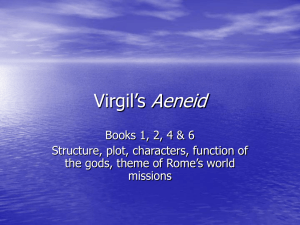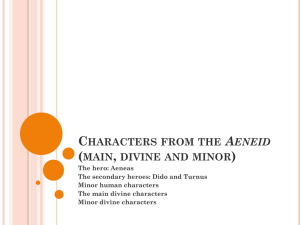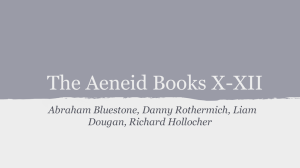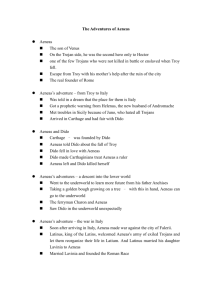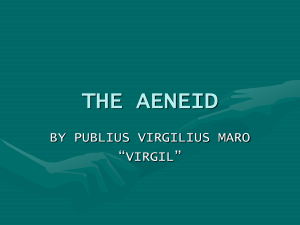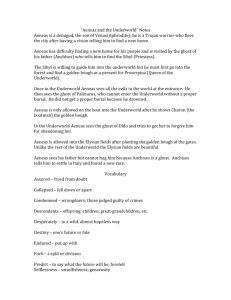Study Guide The Aeneid Capsule Summary Book 1: Aeneas
advertisement
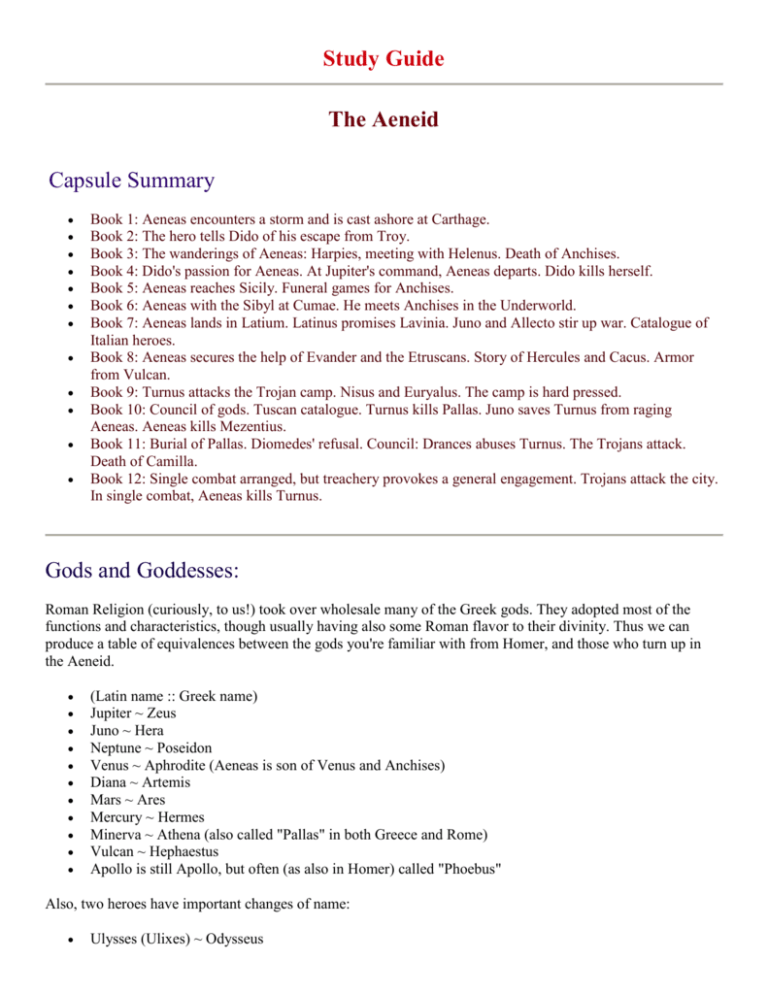
Study Guide The Aeneid Capsule Summary Book 1: Aeneas encounters a storm and is cast ashore at Carthage. Book 2: The hero tells Dido of his escape from Troy. Book 3: The wanderings of Aeneas: Harpies, meeting with Helenus. Death of Anchises. Book 4: Dido's passion for Aeneas. At Jupiter's command, Aeneas departs. Dido kills herself. Book 5: Aeneas reaches Sicily. Funeral games for Anchises. Book 6: Aeneas with the Sibyl at Cumae. He meets Anchises in the Underworld. Book 7: Aeneas lands in Latium. Latinus promises Lavinia. Juno and Allecto stir up war. Catalogue of Italian heroes. Book 8: Aeneas secures the help of Evander and the Etruscans. Story of Hercules and Cacus. Armor from Vulcan. Book 9: Turnus attacks the Trojan camp. Nisus and Euryalus. The camp is hard pressed. Book 10: Council of gods. Tuscan catalogue. Turnus kills Pallas. Juno saves Turnus from raging Aeneas. Aeneas kills Mezentius. Book 11: Burial of Pallas. Diomedes' refusal. Council: Drances abuses Turnus. The Trojans attack. Death of Camilla. Book 12: Single combat arranged, but treachery provokes a general engagement. Trojans attack the city. In single combat, Aeneas kills Turnus. Gods and Goddesses: Roman Religion (curiously, to us!) took over wholesale many of the Greek gods. They adopted most of the functions and characteristics, though usually having also some Roman flavor to their divinity. Thus we can produce a table of equivalences between the gods you're familiar with from Homer, and those who turn up in the Aeneid. (Latin name :: Greek name) Jupiter ~ Zeus Juno ~ Hera Neptune ~ Poseidon Venus ~ Aphrodite (Aeneas is son of Venus and Anchises) Diana ~ Artemis Mars ~ Ares Mercury ~ Hermes Minerva ~ Athena (also called "Pallas" in both Greece and Rome) Vulcan ~ Hephaestus Apollo is still Apollo, but often (as also in Homer) called "Phoebus" Also, two heroes have important changes of name: Ulysses (Ulixes) ~ Odysseus Hercules ~ Heracles Book 1 Aeneas encounters a storm and is cast ashore at Carthage. Dryden's summary: The Trojans, after a seven years' voyage, set sail for Italy, but are overtaken by a dreadful storm, which Aeolus raises at Juno's request. The tempest sinks one ship, and scatters the rest. Neptune drives off the winds, and calms the sea. Aeneas, with his own ship, and six more, arrives safe at an African port. Venus complains to Jupiter of her son's misfortunes. Jupiter comforts her, and sends Mercury to procure him a kind reception among the Carthaginians. Aeneas, going out to discover the country, meets his mother in the shape of a huntress, who conveys him in a cloud to Carthage, where he sees his friends whom he thought lost, and receives a kind entertainment from the queen. Dido, by a device of Venus, begins to have a passion for him, and, after some discourse with him, desires the history of his adventures since the siege of Troy, which is the subject of the two following books. [Summaries taken from book introductions to John Dryden's classic translation of the Aeneid: spelling is regularized to modern conventions, and an occasional phrase or piece of syntax as well.] Principal episodes: The storm. Note the procession of focus from one god to the next: Juno, then Aeolus, then Neptune, then Jupiter. What does this development suggest? What prediction does it coincide with? Aeneas and companion (Achates) meets up with mother Venus in disguise. What about the theme of the hunt? What associations do we have with hunting and goddesses? does that fit Venus? why does Vergil do this? (Note esp. the entrance of Dido: to which goddess is she compared?) Aeneas and Achates see scenes of Troy on the temple of Juno which the Carthaginians are constructing; Aeneas presents himself to Dido Think through what events in this book remind you of events in Homer, esp. in the Odyssey Principal new characters: Juno, wife of the head god Jupiter, Roman equivalent of Hera: hostile (still!) to the Trojans Aeolus, god of the winds Neptune, god of the sea, Roman equivalent to Poseidon Venus, goddess of love, and mother of Aeneas, Roman equivalent to Aphrodite Aeneas, our hero, and son of Venus Cupid, another, very different son of Venus: inspires love in Dido Ascanius or Iulus, son of Aeneas, for whom Venus substitutes Cupid in the meeting with Dido Dido, queen of Carthage, who falls in love with Aeneas Carthage: a city in North Africa, historically the great rival of Rome in the critical period of the third and second centuries B.C.: defeat of Carthage marked the end of serious opposition around the Mediterranean to Roman power, and led to the consolidation of power we know as the "Roman Empire" Troy, the home of Aeneas Tyre, the original home of Dido, before she fled her brother Pygmalion (who murdered her husband Sychaeus) Book 2 The hero tells Dido of his escape from Troy Dryden's summary: Aeneas relates how the city of Troy was taken, after a ten years' siege, by the treachery of Sinon, and the strategem of a wooden horse. He declares the fixed resolution he had taken not to survive the ruins of his country, and the various adventures he met with in the defense of it. At last, having been before advised by Hector's ghost, and now by the appearance of his mother Venus, he is prevailed upon to leave the town, and settle his household gods in another country. In order to do this, he carries off his father on his shoulders, and leads his little son by the hand, his wife following him behind. When he comes to the place appointed for the general rendezvous, he finds a great confluence of people, but misses his wife whose ghost afterwards appears to him, and tells him the land which was designed for him. Principal episodes: Story of the wooden horse. The actions of Laocoon; the story of Sinon; Laocoon and the sea serpents. Hector appears to Aeneas as a ghost. The battle in Priam's palace: Cassandra dragged away; tale of Priam's death; Helen. Aeneas flees Troy, carrying Father Anchises and with little Ascanius by the hand; wife Creusa is lost along the way. Principal new characters: Laocoon, priest of Neptune, killed by the serpents Sinon, the clever Greek Cassandra, daughter of Priam, prophetess who will never be believed Creusa, Aeneas' wife Book 3 The Wanderings of Aeneas: Harpies, meeting with Hellenus. Death of father Anchises. Dryden's summary: Aeneas proceeds with his story: he gives an account of the fleet with which he sailed, and the success of his first voyage to Thrace. From thence he directs his course to Delos, and asks the oracle what place the gods had appointed for his habitation. By a mistake of the oracle's answer, he settles in Crete; his household gods give him the true sense of the oracle, in a dream. He follows their advice, and makes the best of his way to Italy. He is cast on several shores, and meets with very surprising adventures, till at length he lands on Sicily, where his father Anchises dies. This is the place which he was sailing from, when the tempest rose, and threw him upon the Carthaginian coast. Principal episodes: Polydorus in Thrace: bloody shoots from the spears that killed him. Encounter with the Harpies. (what does this tell us about Aeneas' journey? how does it compare for "heroic" flavor with Odysseus' journey?) Visit with Helenus and Andromache in Epirus (Buthrotum) (what does this tell us about the Trojan fate? what does the fact of the "Toy Troy" H. builds imply about Aeneas' mission?) Aeneas and his men skirt Scylla and Charybdis, meet up with a lost companion of Odysseus (Achaemenides) on the island of the Cyclops, and escape Polyphemus (again, how does this compare with Odysseus' travels? why is Aeneas' journey different in these ways?) Anchises dies in Sicily, at the land of Acestes. Principal new characters: Polydorus, son of Priam murdered in Thrace Calaeno, Harpy who prophesies that the Trojans will starve to the point that they eat their tables Helenus, Trojan seer and inheritor of the kingdom of Pyrrhus Andromache, former wife of Hector, then slave of Pyrrhus, now wife of Helenus Acestes, friendly king of a land in Sicily Book 4 Dido's passion for Aeneas. At Jupiter's command, Aeneas departs. Dido kills herself. Dryden's summary: Dido reveals to her sister her passion for Aeneas, and her thoughts of marrying him. She prepares a hunting match for his entertainment. Juno, by Venus's consent, raises a storm, which separates the hunters, and drives Aeneas and Dido into the same cave, where their marriage is supposed to be completed. Jupiter dispatches Mercury to Aeneas, to warn him from Carthage. Aeneas secretly prepares for his voyage. Dido finds out his design, and, to put a stop to it, makes use of her own and her sister's entreaties, and reveals all the variety of passions that are incident to a neglected lover. When nothing would prevail upon him, she contrives her own death, with which this book concludes. Principal episodes: Dido, inflamed by love for Aeneas, consults sister Anna, who advises her of the advantages of marriage with Aeneas Juno and Venus plot to get the two together, and the "marriage" is consumated in a cave in the midst of a hunt (note hunting imagery!) Jupiter sends Mercury to remind Aeneas of his duty, and the hero departs, despite the passionate complaints of Dido (how much of Aeneas' emotions do we see either in the "falling in love" section or in this section, where he decides to leave? how much, in contrast, do we see of Dido's emotions? why is there this difference?) Dido commits suicide, a death "neither fated nor deserved" (!). Principal new characters: Anna, Dido's sister Mercury, messenger of Jupiter [Iarbas, African chieftain] Proserpina (=Persephone in Greek), queen of the Underworld Book 5 Aeneas reaches Sicily. Funeral games for Anchises. Dryden's summary: Aeneas, setting sail from Africa, is driven by a storm on the coasts of Sicily, where he is hopitably received by his friend Acestes, king of part of the island, and born of Trojan parentage. He applies himself to celebrate the memory of his father with divine honors, and accordingly institutes funeral games, and appoints prizes for those who should conquer in them. While the cremonies were performing, Juno sends Iris to persuade the Trojan women to burn the ships, who, upon her instigation, set fie to them; which burnt four, and would have consumed the rest, had not Jupiter, by a miraculous shower, extinguished it. Upon this, Aeneas, by the advice of one of his generals, and a vision of his father, builds a city for the women, old men, and others, who were either unfit for war, or weary of the voyage, and sails for Italy. Venus procures from Neptune a safe voyage for him and all his men, excepting only his pilot Palilnurus, who is unfortunately lost. Principal episodes: As Aeneas and men sail away, a violent storm prevents their course for Italy, and they land again in Sicily, where they are welcomed by Acestes Funeral games for Anchises: ship race, foot race (Nisus and Euryalus), boxing (Dares and Entellus), archery contest; omen of Acestes' arrow, which catches fire (note similarities -- and differences! -between these and the Homeric antecedents) Trojan women, inspired by Iris (who is sent by Juno), fire the Trojan ships (why do they do this? how does the "divine motivation" work? Principal new characters: Euryalus, young "toy boy" friend of Nisus Nisus, friend of Euryalus (you'll see this pair again!) Book 6 Aeneas at Cumae. He meets Anchises in the underworld. Dryden's summary: The Sibyl foretells Aeneas the adventures he should met with in Italy. She attends him to hell; describing to him the various scenes of that place, and conducting him to his father Anchises, who instructs him in those sublime mysteries of the soul of the world, and the transmigration; and shows him that glorious race of heroes which was to descend from him, and his posterity. Principal episodes: Death of Palinurus Preparations for the descent into the Underworld: meeting with the Sibyl at Cumae; search for golden bough (what are the pictures on the temple doors? why these?) Journey into the Underworld: Rivers, Styx, the ferryman Charon, the dog Cerberus; Limbo (the untimely dead: infants, unjustly condemned, unhappy lovers-- where A. meets Dido-- and then the area for warriors -- where A. meets Deiphobus); Tartarus, the place of everlasting sinners; the fields of Elysium, for the blessed (where A. finds Anchises). Note esp. meetings with Palinurus (what Odyssey character does this remind you of?) Dido (ditto: why the reference to Ajax?) Deiphobus (note how this account differs from that of either Helen or Menelaus in the Odyssey: why?). Revelation of the future: Anchises shows to Aeneas the waiting souls of the future, who turn out to be kings and leaders of the Roman race, stretching down to Vergil's day: note especially Romulus, Julius Caesar, "Caesar" (that is, Augustus Caesar = Octavian), Marcellus. Two gates of Sleep, horn and ivory: Aeneas and the Sibyl exit by the ivory gate (!). (what is the meaning of the horn and ivory gates?) Principal new characters: Palinurus, the helmsman Sibyl, the priestess of Apollo at Cumae, who acts as Aeneas' guide down into the Underworld Deiphobus, the Trojan who wed Helen after Paris' death, for which his body was mutilated by the Greeks Styx, main river of the Underworld Lethe (means "forgetfulness" in Greek), river in the Underworld where souls drink to forget their past lives before returning to the world above Romulus, legendary first king of Rome itself, nurtured with his brother Remus by a she-wolf, and thus emblematic of Rome's hardy beginnings. Marcellus, nephew and presumed heir to Augustus, who died unexpectedly in 23 BC, shortly before this passage was written. Book 7 Aeneas lands in Latium. Latinus promises Lavinia. Juno stirs up war. Catalogue of Italian heroes. Dryden's summary: King Latinus entertains Aeneas, and promises him his only daughter, Lavinia, the heiress of his crown. Turnus, being in love with her, favored by her mother, and stirred up by Juno and Allecto, breaks the treaty which was made, and engages in his quarrel Mezentius, Camilla, Messapus, and many others of the neighboring princes; whose forces, and the names of their commanders, are here related in a catalogue. Principal episodes: Story of Latinus and daughter Lavinia: omens of bees, fire in Lavinia's hair (rather like a fairytale, isn't it? why?) The Trojans land and in their hunger "eat the table" (that is, the bread they are using to hold the wild fruits and veggies they're devouring: Ascanius's adolescent joke, but also the fulfillment of the prophecy by the harpy Calaeno)-- the first Roman pizza! Latinus receives the Trojans, and offers his daughter, Lavinia (!) (Note the importance of omens in determining the action here, and the frequency of important omens generally in this part of the epic.) Allecto, a Fury sent by Juno, stirs madness in (1) Amata, (2) Turnus, (3) the Italian farmers and folk. Note that the Italian folk are initially stirred by, of all things, Iulus/Ascanius killing the tame deer of Silvia. (Another hunting motif!) Catalogue of Italian warriors. Principal new characters: Allecto, a Fury Latium, the kingdom of Latinus, where the Latins live, and where Aeneas will eventually found Lavinium Latinus, king of Latium Lavinia, daughter of Latinus, and destined to be the wife of Aeneas, and his fellow ruler over Lavinium (named after her) Turnus, ruler of the Rutulians, and principal foe of Aeneas Mezentius, godless ruler of the Etruscans, another principal foe (we'll see more of him later, esp. book 10) Camilla, an Amazon-like female warrior, another of Turnus' principal allies Book 8 Aeneas secures the help of Evander and the Etruscans. Story of Hercules and Cacus. Armor from Vulcan. Dryden's summary: The war being now begun, both the generals make all possible preparations. Turnus sends to Diomedes. Aeneas goes in person to beg aid from Evander and the Tuscans (=the Etruscans). Evander receives him kindly, furnishes him with men, and sends his son Pallas with him. Vulcan, at the request of Venus, makes arms for her son Aeneas, and draws on his shield the most memorable actions of his posterity. Principal episodes: Aeneas goes upstream with divine assistance and visits Evander. Evander promises the help of the Etruscans. Evander tells the story of Hercules and Cacus. Venus asks Vulcan to make Aeneas armor. The shield contains images of the many famous wars fought by Aeneas' descendants, culminating in the battle of Octavian over Marc Antony at Actium (31 BC). (Note how Aeneas is linked back to Hercules -- the earlier, heroic generation, and then forward to the "present" time of Octavian/Augustus.) Principal new characters: Evander, local king (of Pallanteum) who sides with Aeneas against the Latins, and suggests the Etruscans as allies Pallas, the son of Evander (he will become a Patroclus-like figure: watch for this!) Cacus, a man-eating, fire-breathing monster defeated and killed by Hercules for stealing his cattle Vulcan, husband of Venus, maker of the arms Cyclops, helpers of Vulcan at the forge (note how different from Homer's Cyclopes!) Actium, 31 BC, the critical victory of Octavian (soon to be Augustus) Caesar over the opposing forces of Marc Antony (=Antonius in your text) and Cleopatra: this is the central scene in Aeneas' shield Book 9 Turnus attacks the Trojan camp. Nisus and Euryalus. The camp is hard pressed. Dryden's summary: Turnus takes advantage of Aeneas's absence, fires some of his ships (which are transformed into sea nymphs), and assaults his camp. The Trojans, reduced to the last extremities, send Nisus and Euryalus to recall Aeneas; which furnishes the poet with that admirable episode of their friendship, generosity, and the conclusion of their adventures. Principal episodes: Turnus and allies attack the Trojan camp (which is remarkably like a Roman fortification of the first century!) and try to fire the ships, but Cybele descends and turns the ships into sea nymphs (why this crazy, surreal image here? what does it do to our interpretation of the divine intrusions into the conflict?) Nisus and Euryalus go forth on a raiding expedition (what sort of warrior and warrior relationship is this striking episode a model of?) The "aristeia" of Turnus: like a lion let loose in the sheep fold, he rages within the Trojan camp before finally being pushed out by overwhelming numbers Principal new characters: Nisus and Euryalus revisited: review their appearance earlier, in book 5 Book 10 Fight continues. Tuscan catalogue. Turnus kills Pallas. Juno saves Turnus from raging Aeneas. Aeneas kills Mezentius. Dryden's summary: Jupiter, calling a council of the gods, forbids them to engage in either party. At Aeneas' return there is a bloody battle: Turnus killing Pallas; Aeneas, Lausus and Mezentius. Mezentius is described as an atheist; Lausus as a pious and virtuous youth. The different actions and death of these two are the subject of a noble episode. Principal episodes: Council of the gods (what do we find here about who is responsible for what has happened to the Trojans? what does Juno say? what does Jupiter say?) Death of Pallas (what does Turnus take as a prize?) Deaths of Lausus and Mezentius (why the contrast between this father-son pair, the one pious, the other impious?) Principal new characters: Pallas, son of Evander (to what Iliadic figure does he seem to compare?) Lausus, the virtuous son of Mezentius Mezentius, former king of the Etruscans (=Tuscans), so evil that the Etruscans drove him out and fight against him alongside Aeneas; a godless man Book 11 Burial of Pallas. Diomedes' refusal. Council: Drances abuses Turnus. The Trojans attack. Death of Camilla. Dryden's summary: Aeneas erects a trophy of the spoils of Mezentius, grants a truce for burying the dead, and sends home the body of Pallas with great solemnity. Latinus calls a council, to propose offers of peace to Aeneas; which occasions great animosity betwixt Turnus and Drances. In the meantime there is a sharp engagement of the horse; wherein Camilla shows herself remarkable; is killed; and the Latin troops are entirely defeated. Principal episodes: Council of the Latins (what exactly is Drances' argument against Turnus? what is Turnus' reply?) Aristeia and death of Camilla, an Amazon-like maiden warrior (why this female figure here?) Principal new characters: Drances, Latin elder who does not fight, but is an enemy of Turnus and an advocate of peace with the Trojans Camilla, an Amazon-like Volscian maiden warrior, ally of Turnus Book 12 Single combat arranged, but treachery provokes a general engagement. Trojans attack the city. In single combat, Aeneas kills Turnus. Dryden's summary: Turnus challenges Aeneas to a single combat: articles are agreed on, but broken by the Rutuli, who wound Aeneas. He is miraculously cured by Venus, forces Turnus to a duel, and concludes the poem with his death. Principal episodes: Single Duel between Aeneas and Turnus; Breaking of the truce; Wounding and miraculous cure of Aeneas (what book in the Iliad does this resemble? [Book 3, duel between Menelaus and Paris: thus what roles do Aeneas and Turnus play?]) Death of Turnus (in what ways is this like, in what ways different from Achilles' slaying of Hector?) Principal new characters: (None)
